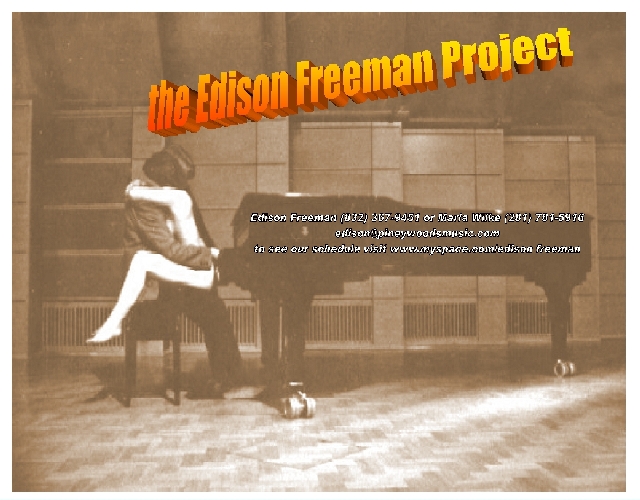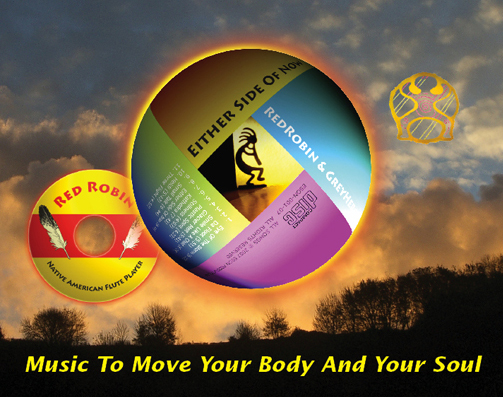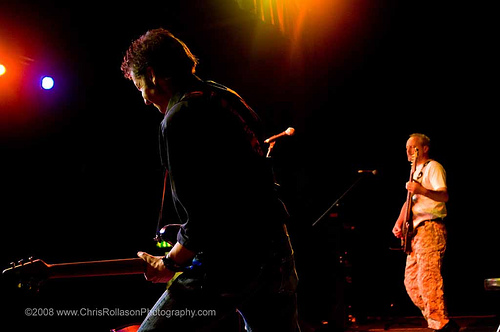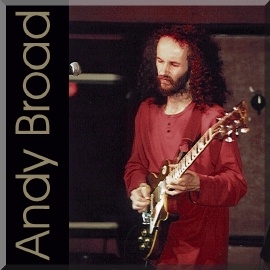Topics

Basic (free) Member
|
| | | |

edison freeman and the color of fire
|
2/8/2008 7:37:10 AM
rant on recording
Ah, recording music...
So many folks doing this have started overamping on the technical that they stop trusting their ears to tell them everything they need to know.
Twist knobs. Make mistakes. Listen to so much good music it makes blood come out your eyes, and constantly compare your own work to that.
I have an extremely tech mind. but in music i stayed mostly intuitive, until i ran into the internet crowd. i was obsessed to learn everything i could about music production from a technical standpoint. The more i learned, the worse it sounded to me...i strove to learn more, a bottomless pit...and had no time to sit down and write a song...
My breakthrough came when one day i just started twisting knobs based solely on what my ears wanted to hear, one set of monitors, 3 switchable eq settings for those, and a set of sennheiser cans...
Now i just don't worry about it.
The most important thing one can know technically is what frequencies certain sounds occur at. It just speeds up the process if you have a ballpark starting point on a sound that isn't quite right.
The other thing is to have your ears trained to recognize compression. what is too much, what is too little...
...and fuck the rest of the tech crap, it isn't necessary for you to know unless you intend to be a designer or manufacturer of gear. Just know how to read the specs on gear, it can save you some money :)
The rest of the process should be totally about the music.
That is the subject, isn't it?
One of my major gripes about a lot of the net recording crowd is that they couldn't hear a great song if it bit them in the ass, all they hear are production values. Most of my favorite records from the 50's and 60's are suck productions, with great songs being done by very raw performers.
i'll take early kinks anyday.
[/rant]
|

|

RedRobin
|
2/8/2008 7:58:33 AM
Like you (if I've understood you correctly), I view recording gear as just another musical instrument and do everything by ear. The numbers and values do serve to help understand what's happening and to give future reference when you discover a sound you really like.
Being confronted with something like Apple's Logic Pro for the first time is a bit like being on Concorde's flight deck! Great when you've got the basics though and very enabling.
|

|

satch
|
2/8/2008 8:21:46 AM
Apple's Logic Pro is a bad example - it's the most illogical musical software suite on the market! Now ProTools... now you're talking logical! :)
Edison, for me the truth is that if you start with good quality real instruments played well, and you record carefully using good mic's and good mic preamps, then your mixing process should be pretty darn straightforward anyway! Just a little eq to sweeten here and there, a little cut to clarify here and there...
But compression, that's a key element in getting your mixes to sound consistent across the multitude of systems that will be playing back your mixes...
|

|

GREAT CENTRAL
|
2/8/2008 8:28:07 AM
it is a dangrous trap to fall into, one that i confess i have been caught in, now i try to stick to just a little reverb and some compression, don't even use too much EQ, if one has ones mics in the right place you can get most of the tones an EQ will force...
although, it is slightly different when talking about electronic music, there i think you have to let the technology work for you, but even then, as you say it comes down to what sounds right, happy accidents etc.
|

|

edison freeman and the color of fire
|
2/8/2008 8:40:13 AM
Right on Satch. My later recordings, made with better mics and mic placements, on better sounding instruments testify to that. They were easy to mix.
Also, always comparing to the recordings I love is key, so I learn how things should sound on my speakers. Tuning of the ears, so to speak...
I am gentle with compression now. Most of the stuff I hear today is SO compressed that it has no dynamics at all.
That being said, I think a generation of folks listening to stuff through earpods are like we were in the day, listening on cheap automotive AM radios. It was all about the SONG. Production values really don't impress the general public that much by comparison.
I don't want to see other songwriters to go through what happened to me, to focus so much on the art of recording that they lose their focus on creating good songs.
That's why I brought up the example of the early Kinks. Simple, terrible recordings of great perfomances of great songs. I find those eminently more listenable than todays polished turds, hahaha. Which is why I love the indie scene, and what the home recording revolution has created. It's a return to a golden age of creativity.
|

|

Bruce Boyd
|
2/8/2008 6:10:41 PM
My first experience with computer based recording was back in the '90s. We were a rollicking Aussie Bush Band and wanted to capture that "raw" essence so we recorded live in the studio. The producer had this saying "Let's just dump it all onto ProTools and then see what we've got".
So then it got to editing - EVERY note meticulously slid into micropefect timing and pitch accuracy. It took far longer than the recording. Instruments like the fiddle and dobro lost their vibrancy.
So when I went digital in my home studio I determined not to have a screen based system:
If I make a glaring timing or pitch error I have to go back and do it again.
I only use the preset compressions, reverbs and mastering algorithms - after all the guys that wrote them are probably bigger tech-heads than I'll ever be.
I only have 8 tracks - if the Beatles could produce "Sgt Pepper's" on two 4-tracks synced together then that should be enough for little old me.
I like to use lo-tech equipment - OK good mikes are a must for vocals, but I just use an SM58 clone to close mike my amp for electric guitar - that was good enough for Clapton on the "Beano" album.
And cheap instruments? - oh yeah! Just listen to the ocarina solo on "Wild Thing" by the Troggs as one example.
|

|

Pulse Eternal
|
2/8/2008 6:26:31 PM
Quote by Satch
Apple's Logic Pro is a bad example - it's the most illogical musical software suite on the market! Now ProTools... now you're talking logical! :)
Edison, for me the truth is that if you start with good quality real instruments played well, and you record carefully using good mic's and good mic preamps, then your mixing process should be pretty darn straightforward anyway! Just a little eq to sweeten here and there, a little cut to clarify here and there...
But compression, that's a key element in getting your mixes to sound consistent across the multitude of systems that will be playing back your mixes...
I absolutely agree with you Satch, especially about Protools. Coming from a tape and razor blade studio environment, Protools just feels SO much more logical and intuitive. There's a good reason why it is pretty much the industry standard. :-)
One thing I am really pushing for is the end of all this ridiculous brick wall limiting done by supposed professionals in the name of having a LOUD CD!! It sounds terrible!
In fact, I am going a step further and have registered my interest in getting my studio SuperPuss
 
=^.^=
|

|

Pulse Eternal
|
2/8/2008 6:29:52 PM
Grrrrrr...... damn thing cut off half my post and there is NO EDIT!!!
Here's the rest......
One thing I am really pushing for is the end of all this ridiculous brick wall limiting done by supposed professionals in the name of having a LOUD CD!! It sounds terrible!
In fact, I am going a step further and have registered my interest in getting my studio Turn Me Up! certified. I am totally against this absurd loudness war and absolutely refuse to destroy the dynamics of a great recording just to be as loud as some of the appalling final products on the market.
I am the same with song choices for my stations too. If a song is too quiet, I will usually not include it unless it is a standout song but, if a song is hypercompressed I will not include it no matter how good it is.
Sorry to have gone off topic but I am absolutely passionate about this issue.
At the end of the day though Edison, as passionate as I am about quality, I agree that it is ultimately all about the music.
SuperPuss
 
=^.^=
|

|
.jpg)
Vincenzo Pandolfi
|
2/8/2008 10:42:35 PM
Well said Superpuss!!
Vincenzo
|

|

Jeff Allen Myers
|
2/8/2008 10:54:22 PM
I agree,...I am sick of fighting the Loudness war......Thats what the fricken Volumn knob is for, Personal taste..you want it louder, Turn it up!!! It does not need to be mastered that way.
I am with you Vincenzo,.... I record, watch the faders so they don't clip, try to get the best performance I can, then mix! .. I love the process, but I do not get caught up in the details...I trust my ears and instincts. Can my mixes be improved? No doubt, but I try to put the music and creativity first. I Learned the EQ basics, and try to find a place for all elements. Whether it be panning left to right, or Front to back with reverb. There is no substitute for a good song, performance, technique, and character of Voice.
|

|

TNT
|
2/9/2008 1:25:43 AM
Hello everyone, I'm Ian Hooley from TNT.
I'd like to add something to this discussion from a different perspective!
Firstly let me say that as an artist I agree completely about the loudness wars. They are only serving to destroy the quality of the recorded music giving less dynamics, and the listeners all have volume knobs!
HOWEVER!!!!!!!
I am also a mastering engineer! (No I didn't master the TNT stuff).
Week in week out I master singles and albums for local bands. Most of them sit in on the sessions to pick up tips on recording, and to be a part of the whole process. The real reason the loudness wars will continue to rage is that when the bands/artists bring reference material to me, they expect their material to sound the same at the end. No matter how often I tell them that it's about the overall eq/compression/stereo image etc.......... They also want their recordings to be at the same level as their favourite recordings.
Another reason for this is the simple fact that that if you were to listen to a comilation of un-loudness treated material, you'd spend as much time using the volume knob as listening to the music!
The problem is not the loudness wars, but the formats for which the material is being masterered!!!!!
If you master someting to sound particularly good on myspace (to be fair some bands here will only ever use it there) then you are mastereing the material for lo quality steaming, with heavey compression in the file type, and limited frequency response.
It's our duty as mastering engineers to give the customers what they want, but also to educate them and master their material to the best possible quality available.
When I have equipment capable of delivering between 16Hz and 50kHz, why the hell would I want to master for the band between 250Hz and 17kHz?????
I've got another session this afternoon, and another factor to consider is what MIX engineers are doing with the material before it gets mastered. A great mix needs little mastering other that good coding practice, a poor mix can never be fully resored in the mastering process.
Lol
|

|

Andy Broad
|
2/9/2008 3:20:52 AM
"Another reason for this is the simple fact that that if you were to listen to a comilation of un-loudness treated material, you'd spend as much time using the volume knob as listening to the music!"
That's a justification for retention of the concept of an album, if ever I heard one.
When everybody is listening to random playlists selected from wide range of sources, a sudden quiet track (or over loud) might cause problems, but in context the quiet bits are supposed to be quiet, or conversely the lous bits are supposed to be LOUD :-)
|

|

TNT
|
2/9/2008 3:38:51 AM
Andy, I agree with you completely.
Wher the loudness wars are causing problems is not in the way they make the PEAK levels of all recordings the same, but when it goes further - and makes the quiet passage in one song the same level as the loud passage in the same song.
mp3 is as resposible for the death of quality recording as anything in my opinion. Once everyone is used to and happy with mp3 quality our ears will learn to accept this as the norm, and hi-fidelity will take years to re-introduce itself.
None of this has anything whatsoever to do with the music however. A quality song will usually win out, no matter what processes are applied to it, (withing reason and in capable hands).
Most recordings done by the musicians themselves are not done with the knowledge required to do them justice.
Innexperienced recording engineers should never go anywhere near a compressor unless they really know what they are doing, or are being shown.
Compression can kill a recording more easily than anything else.
I guess what I'm saying is that in depth knowledge of recording equipment and DAW software is VERY important if you want to make quality recordings, but not essential in the making of quility music!
|

|

Larry Migliore
|
2/9/2008 5:13:07 AM
For me, I write the tune. Do a work type demo on my 8track Tascam, burn a CD and listen in the car. From there, I send it to Nashville and have my demo producer whip it into shape and in three weeks I have a "demo" that quite frankly blows away alot of what I hear on radio (internet or air). I have severely damaged my ears over my lifetime and I can't trust them to hear frequency. So I keep it simple. Drum machine, guitar, bass and scratch vocals. Just like the songs were recorded way back when.
You can keep all the technical bullcrap, just pass the meat and potatos!
|

|

BJ
|
2/9/2008 4:14:19 PM
You can hear the compressors "breathing" on the early "The Who" singles as they struggled to keep Keith Moon's manic drumming in check. Yet 40 years on they're still classics.
So yeah, a good song and good musicianship are far more important than production subtleties.
|

|
| |
�2015-16 IndieMusicPeople.com All Rights
Reserved
| |
|